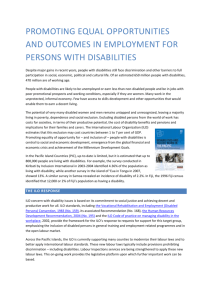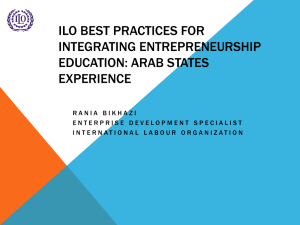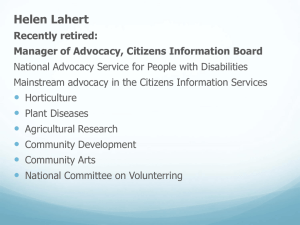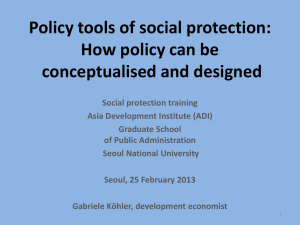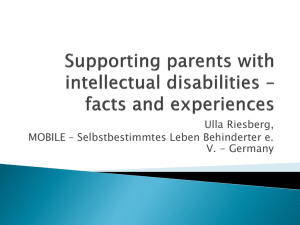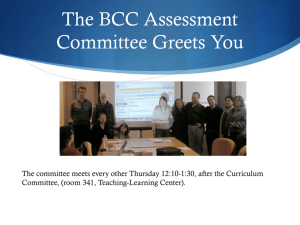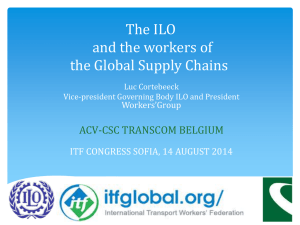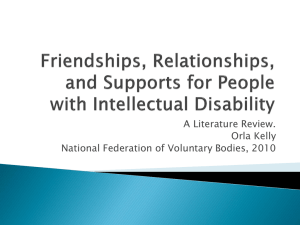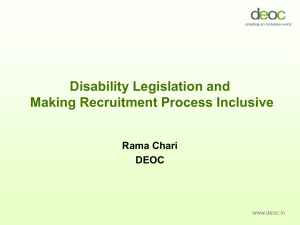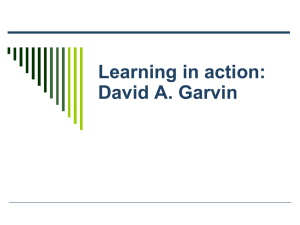Vocational Training – Persons with Disabilities: International
advertisement
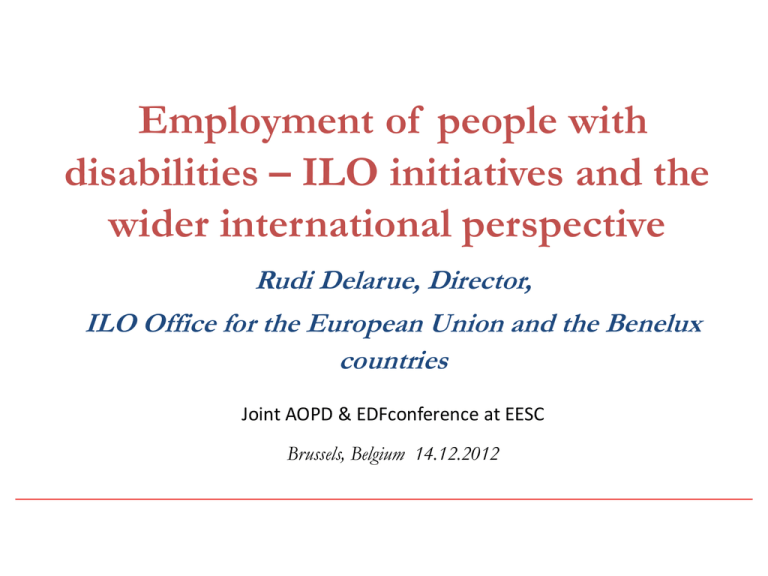
Employment of people with disabilities – ILO initiatives and the wider international perspective Rudi Delarue, Director, ILO Office for the European Union and the Benelux countries Joint AOPD & EDFconference at EESC Brussels, Belgium 14.12.2012 Overview • What is the International Labour Organization? • What does ILO do to promote inclusion and job opportunities for people with disabilities? Longstanding ILO committment (first instrument already in 1925, Recommendation N° 22) • What opportunities are there for people with disabilities around the world? At least 785 million persons with disabilities are at working age Estimated loss of exclusion of persons with disabilities: between 3 and 7 % GDP in some countries (ILO studies) • Wider international context and integration of human rights in EU external policy and action International Labour Organization • Specialized Agency of the United Nations • Set up in 1919, over 90 years ago • 185 Member States • Tripartite in Structure • Involves employer and worker representatives as well as governments • Decent Work Agenda • • • • Employment, including skills and vocational training Social protection Fundamental Principles and Rights at Work Social dialogue How ILO promotes decent work and inclusion for people with disabilities • ILO Standards on Disability • Developing Knowledge on Good Practice • Research, Evaluation • Publications • Advocacy • Policy Advice • Meetings and seminars • Training programmes • Long standing cooperation with social partners and wider civil society • ILO Global Business and Disability Network: 40 MNEs and 18 national employers organisations and business associations • Tackling disability included in almost 50% of Decent Work Country programmes • Technical Cooperation Services What are ILO Standards? Conventions - Similar to international treaties - They set down international Labour standards - Are legally binding on States which ratify them Recommendations Non -binding guidelines on labour standards, which Guide national policy and practice They may accompany a convention, or stand alone Codes of Practice - These are agreed, non-binding, rules and procedures, which are usually written in legal language, to support the implementation of law ILO Standards on Disability • Convention 159 on Vocational Rehabilitation and Employment (Disabled Persons), 1983 – ILO up to date convention – Ratification promoted – More and more ratified: • • • • 82 ratifications in 2012( from 59 in 1998) thanks to ILO efforts supported by limited resources only!!! most EU member states have ratified more ratifications in other parts of the world in MENA e.g.: Bahrain, Jordan, Kuwait, Lebanon, Tunisia, Yemen – Strongly influenced CRPD – Renewed support by ILO Governing Body, November 2012 http://www.ilo.org/gb/GBSessions/GB316/pol/WCMS_191384/lang--en/index.htm • • • Recommendation 168, 1983 Recommendation 99, 1955 Code of Practice – Managing Disability in the Workplace, 2001 What ILO Convention No. 159 requires • States should develop policy based on – – – – • Equality of opportunity for disabled persons Equality of treatment of women and men with disabilities Promoting access to general programmes and services, alongside nondisabled persons, where possible (Mainstreaming ) Introduce special positive measures to compensate for disadvantages Underlying convictions – – Obstacles faced by disabled persons arise largely from societal barriers, rather than solely from impairments People with disabilities represent great potential, yet to be fully unlocked Advocating Equal Opportunities • Example - Conference in Lusaka, Zambia, March 2010 • Opening Pathways to Training and Employment for People with Intellectual Disabilities in the African Region • Attended by government, employer, trade union and civil society • Looked at what is working, to enable people with intellectual disabilities to get good jobs. • Addressed by people with intellectual disabilities from 5 countries • Participants adopted Lusaka Declaration Technical Cooperation Projects • Example • Promoting rights and opportunities for people with Disabilities through legislation 2012 – 2013 • Will provide technical advice and training for decisionmakers and service providers in China • Aim: People with disabilities benefit from decent work opportunities Employment opportunities for people with disabilities around the world • High income countries • Sheltered workshops - Still widespread, but no longer popular with policy-makers • Supported employment - Involves on-job-training in ordinary workplaces - Job-coach provides support as long as needed - Growing emphasis on this option in many countries • Social firms - Businesses trading for social or environmental purpose - Over 25 percent of employees – disadvantaged people - Reasonable accommodations made for employees, relevant to their needs. • Community economic development initiatives Employment opportunities for people with intellectual disabilities around the world (2) • Low income countries • Village-based industries - Including farm work • Self-employment, small business enterprises - May be in family-run businesses - Could involve Community Economic Development initiatives • Supported Employment - Has been tried in some countries in the form of pilot projects - Limited application, as most new jobs in the informal economy What needs to be done next, by whom? • Governments • Gather information on current employment situation of people with disabilities, as well as barriers to employment and success factors • Develop a national policy on integrated employment for people with disabilities • Develop a national implementation strategy • Track progress through effective data collection • Widely disseminate positive results of pilot projects What needs to be done next, by whom?(2) • Service providers • Programmes should aim at inclusion in the mainstream - provide on-going formal and in-formal supports - Ensure well-planned transition from school to work • Effective data systems needed, to inform programme monitoring and development • Career guidance and planning important to ensure progression beyond entry-level jobs • Adequate training required for Supported Employment job coaches • Success stories should be gathered and publicized • Role models for job-seekers with intellectual disabilities • Way of convincing potential employers that people with intellectual disabilities can be loyal, productive workers. Promoting decent work opportunities for people with disabilities in their communities • Fundamental Changes required - including in – Roles of • special disability agencies, service providers • mainstream agencies, service providers • disability advocates – Involvement of social partners • Employers • Trade unions • Civil society – Certain types of services and programmes • Sheltered Employment • Vocational training Wider international context and integration in EU external policy and actions • ILO part of Inter-Agency Support Group for the CRPD • More attention for human rights in external policy and actions, including in EU development cooperation ? New function of special EU representative for human rights in EU external action: highligthed importance of socio-econmic rights • ILO contributed to EC consultation on EC guidance note on disability in development cooperation but no practical EC support yet for ILO related actions on disability (but e.g. very significant support by Ireland) • More attention to human rights in renewed EU neighbourhood policy • EU part of CRPD and part/involved in other human rights discussions (e.g. also within ILO) Wider international context and integration in EU external policy and actions • Post 2015 development framework and sustainable developments goals offers opportunities – to move towards an integrated and more comprehensive approach – less top down approach: role for workers, employers and other parts of civil society – for better integrating economic, social, employment and environmental goals with a rights based approach But administration and management of EU assistance based on so-called sectors or themes(2, max 3 by country with exception of ENP): how can this support integrated social and economic development? Why not supporting integrated national/regional development strategies Read more about ILO including its work for Persons with Disabilities www.ilo.org/disability www.ilo.org/inclusion www.ilo.org/brussels

